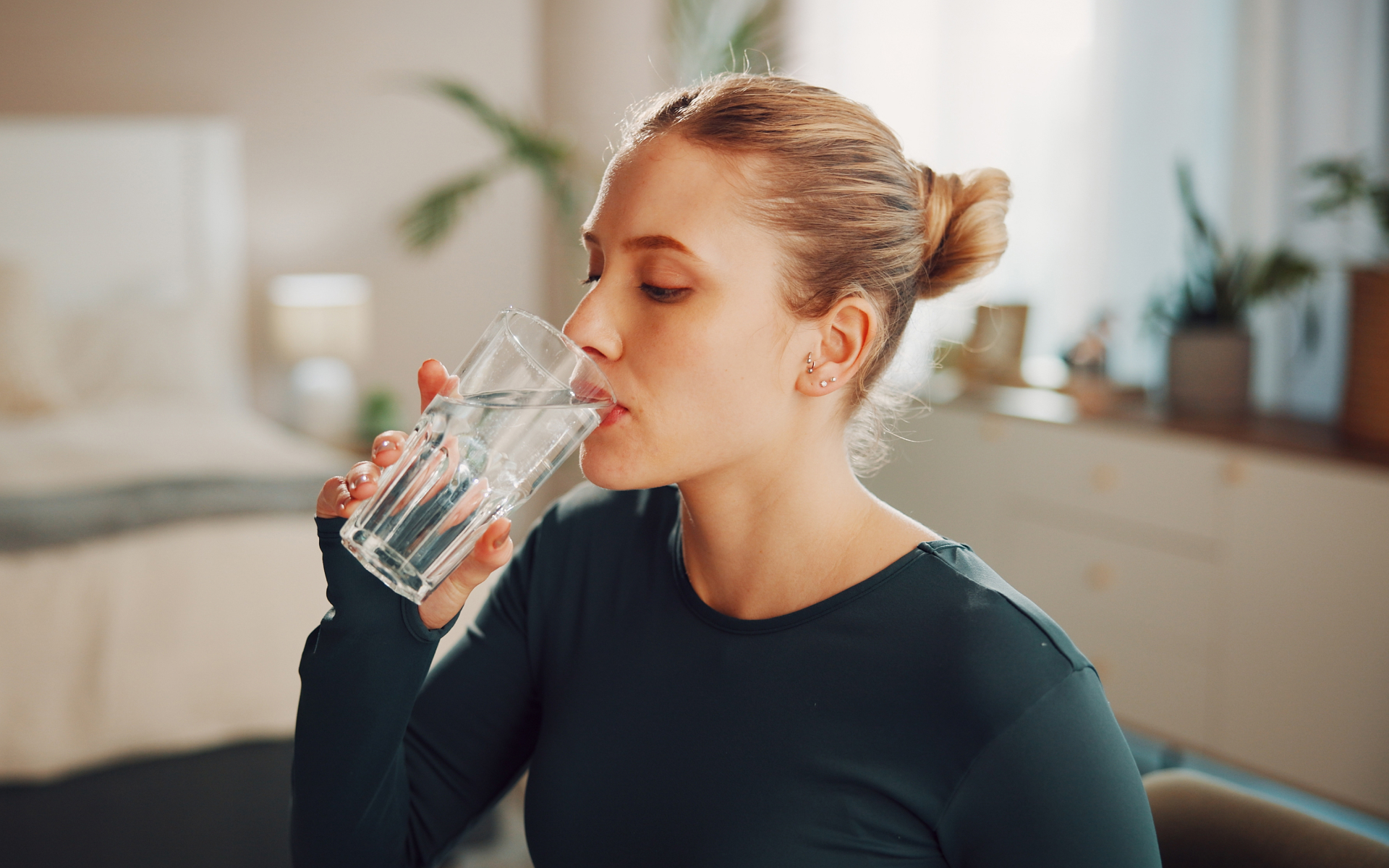Fasting is an ancient practice that is common in many human cultures. Some people engage in it for a religious purpose like the Muslims Ramadan fast. But recently people have been exploring the health benefits of this exercise in a non-religious way. Avid weight-watchers, health nuts and fitness enthusiasts – all have found it quite beneficial to engage in different forms of intermittent fasting. When participating in this practice, an emphasis is placed on what you consume and when you do it. People often come up against a slew of questions concerning intermittent fasting.”How much water should I drink while fasting?” is usually one of them.
Especially when you are partaking in a prolonged fast, it is crucial to always stay hydrated. Water is an essential nutrient, and over two-thirds of the human body is made up of it. Beyond that, its importance in our daily lives cannot be overemphasized. Our body needs it for hydration, and it is also essential for transporting nutrients and oxygen to the body’s cells (5). Water plays a paramount role in cleansing the bladder of bacteria, digestion, ensuring that the blood pressure of the body is moderate, and stabilizing the heartbeat. Water has also been found useful in protecting organs and tissues, regulating the body temperature, and maintaining the sodium balance in your body.
How the Body Regulates Water
As you may already know, plant and animal life cannot exist without water. For this reason, these living organisms had developed and adapted their bodies to avoid dehydration. For humans, ways through which you can detect when your body needs more water include the following:
Thirst
This is an automatic water level detection capacity of the human brain. It is the signal that prompts us to crave water when we are running low on it.
Urine output
The kidneys regulate any excess or lack of the water we consume by either emptying it into the urinary bladder or holding onto it in the blood plasma. Interestingly, the body expels 0.5 to 1 liter (around 17 to 34 fl oz) of water per day in the form of urine.
The kidneys also regulate the balance of electrolytes, such as sodium and potassium, in the body fluids. They receive hormonal signals to conserve or release water into the urine if the brain detects changes in the concentration of the solutes in the blood. More so, the brain responds to these changes in solutes, known as plasma osmolality. This is one factor that triggers the thirst for water.
Lean and toned up body isn’t just a far-fetched fantasy. Check out the BetterMe app and watch it propel your weight loss journey into high gear!
Factors That Influence Water Needs
You have probably heard about drinking a particular quantity of water per day. Still, the right amount of water you need to consume daily depends on several factors which are given below (10):
Frequency and level of physical activity
The amount of water intake is dependent on the type of activities you are involved in daily. For example, those engaged in intense activities, where they sweat profusely, like athletes, need to drink water more frequently to restore the fluids and electrolytes they’d lost.
Environmental factor
The type of environment you live in is also a contributing factor in the rate of water loss as well as the rate of water replenishment you will require. For example, those who live in a humid and hot environment tend to lose more water, so they need to keep their fluid intake up at all times.
Overall health
Health plays an essential role in determining the amount of water that you need to consume. The current state of your health may require that you consume more or less water. If you are racked with diarrhea, more fluids are lost from your body through stooling; therefore, you need to sip on water more frequently to shield your body from dehydration.
Pregnancy or breastfeeding
This is another important point in determining how much water you need. Women who are pregnant or nursing mothers need to keep their fluid intake up to stay healthy because their body loses water at a fast rate.
How Much Water Should You Drink In a Day?
Some surveys suggest that while about 20 percent of our body water level comes from food (depending on the diet), the remainder comes from liquids. Nevertheless, keep in mind that celery, watermelon, soups etc. quench your thirst, fill you up and deliver vital nutrients. This is why a higher intake of fresh fruit and vegetables equals a higher intake of water.
The body needs water for most of its functions. However, we are always involved in activities that make our bodies lose water. We lose water through our breathing, perspiration, urine, and bowel movement. In short, every metabolic reaction in the body leads to the loss of water. Since the body is made up of water, any loss of it needs to be replaced as often as possible for the body to keep functioning correctly. This is one of the reasons why it is usually encouraged to stay hydrated even if a person is fasting.
How Much Water Should Adults Drink In a Day?
Some recommendations state that adults should drink a milliliter of liquid for every calorie of food, which means that women should drink two liters on a 2000 calorie diet, and men need to drink two and a half liters on a 2500 calorie diet. Others set a recommended intake level at 2.7 liters per day for women and 3.7 liters for men. People who are later in years are often recommended to drink between six and eight glasses of water daily, which has become popularly accepted.
Still, most professionals in the health and nutrition industry now agree that there is no need to have an exact figure attached to the amount of water that our body needs daily. They believe that the brain mechanism that controls the need to rest and eat is strong enough to give an accurate signal when the body requires a refill of water (6).
Read More: Best Drink To Lose Weight Fast-Healthy Fat Blasting Beverages To Try Today!
How much water should I drink while fasting?
When you are fasting, you refrain from certain types of food and abstain from eating within a specific period of time. When you are water fasting, you are allowed to drink as much water as your heart desires. Typically, water fast lasts for 24 hours to 72 hours. Most nutritionists advise that water fast shouldn’t exceed 72 hours. However, with medical guidance and monitoring, it is possible to go on this fast for days in a row.
When you are fasting, you are encouraged to drink more water to stay hydrated. Generally, the quantity of water should be determined by how thirsty you are. However, based on a 2012 review on Thirst and Hydration Status in Everyday Life, it was reported that fluid balance controls thirst based on critical regulation by the central and peripheral mechanisms (7). Thirst should not be the primary determining factor on when you should drink water and how much you are supposed to drink. Since, according to the authors, certain factors like age and diseases can also influence your thirst level, so, they should be taken into consideration.
Another factor that can guide you on when and how much water you should drink is the color of your urine. When there is a drop in your water level, there will be a change in your urine color. In case when your urine is very clear, it may mean that you are overhydrated. When it is dark yellow, that could be one of the signs of dehydration.
Looking for a way to break the vicious cycle of weight loss and tone up all the jiggly parts? Watch the extra pounds fly off and your muscles firm up with the BetterMe app!
How much water should I drink while water fasting to lose weight?
The primary factor that determines it is your weight. An average person who’s looking to shed off some pounds can follow the recommended 8 eight-ounce glasses of water per day (8). Unfortunately, a survey carried out by the National Cancer Institute and analyzed by the Centers for Disease Control and Prevention (CDC) found that seven percent of adults don’t bother drinking a glass of water while only 22% drink 8 glasses or more (3).
On the recommended quantity, some factors, including your activity level, environment, and overall health (as discussed earlier), still influence it. So, while you are shooting for the daily recommendation, it doesn’t mean that you shouldn’t drink more when you feel dehydrated. The only thing is that you should not overdrink and risk water intoxication, which is also called hyponatremia, although this is rare.
Benefits of Engaging in a Water Fast
When you engage in this practice, some of the benefits that you stand to gain include the following (9):
Facilitates Weight Loss
Can you lose weight by not eating and just drinking water? Absolutely! An extended period of water fasting will lead to the loss of weight because there is no new calorie intake. However, the number on your scale starts dropping mainly due to the loss of glycogen and not calories because your body only begins to use up fats after a more extended period.
Reduction in Blood Pressure
Amongst the many benefits of embarking on a water fast, this practice has been discovered to help reduce the blood pressure due to no salt intake during this period. However, it may take up to two weeks before any substantial result can be achieved. It means that you have to continue fasting beyond 72 hours before you can normalize your blood pressure. This should only be attempted under medical supervision.
May Promote Cell Recycling
Do you know that fasting may help you prevent cancer? In a research that was carried out on animals, it was discovered that water fasting could promote autophagy (1). Autophagy is the process where the cells in the body are recycled. This process helps to protect the body against cancer.
Reduces Chances of Disease
Fasting can help shield your body from deadly terminal diseases. In another study that was carried out on some animals, the result showed that water fasting could help protect your body from free radicals that damage the heart. It may also help to stop the growth of tumors (4).
Protection Against Diabetes
Diabetes is another life-threatening disease that can be prevented with regular fasting. In recent research, it was discovered that any type of fasting, including water fasting, may increase your insulin sensitivity, thereby reducing the risk of developing type 2 diabetes (2).
Drawbacks of Water Fasting
While water fasting may have a number of health advantages, there are some apparent drawbacks that should be considered beforehand.
Nutrient Deficiencies
Fasting of any kind can result in nutrient deficiency. Not eating is not only going to stop calories from entering your body, but it also means you will be deprived of essential vitamins, minerals, fatty acids, amino acids, and all that your body needs to stay strong and healthy and keep your metabolism up and running.
Dehydration
About 20% of the water we need for everyday survival is received from the food we eat. However, drinking less water than you normally would could still potentially lead to dehydration.
Hyponatremia
Hyponatremia occurs when water and salt lost through sweating is replaced by only water. This can occur during water fasting when the person is not eating the required food to replenish the salt needed for the body. Therefore, it is not advisable to take part in any physical exercise that will make you sweat profusely during this period. , and to consult your physician before attempting a prolonged fast.
Dizziness, Fatigue, and Trouble Focusing
Due to an extreme calorie restriction, water fast can cause weakness, dizziness, and fatigue. It can also lead to difficulty in focusing.
A note of caution
When you decide to break your water fast, especially if you have gone for more than 48 hours, it’s advisable not to eat a big meal immediately after. Your body needs some time to restore balance. Some common consequences of eating a big meal immediately after water fast may include nausea, constipation, digestive discomfort, and so on (9). Before you explore the benefits of water fasting, make sure you consult with your physician and nutritionist.
In conclusion, the benefits of drinking water when fasting play a significant role in how healthy the body becomes. When you ask yourself “how much water should I drink while fasting?”, make sure to take your thirst level into consideration and pay attention to your urine color as it can help you figure out whether you are overhydrated or dehydrated.
DISCLAIMER:
This article is intended for general informational purposes only and does not serve to address individual circumstances. It is not a substitute for professional advice or help and should not be relied on for making any kind of decision-making. Any action taken as a direct or indirect result of the information in this article is entirely at your own risk and is your sole responsibility.
BetterMe, its content staff, and its medical advisors accept no responsibility for inaccuracies, errors, misstatements, inconsistencies, or omissions and specifically disclaim any liability, loss or risk, personal, professional or otherwise, which may be incurred as a consequence, directly or indirectly, of the use and/or application of any content.
You should always seek the advice of your physician or other qualified health provider with any questions you may have regarding a medical condition or your specific situation. Never disregard professional medical advice or delay seeking it because of BetterMe content. If you suspect or think you may have a medical emergency, call your doctor.
SOURCES:
- A Comprehensive Review of Autophagy and Its Various Roles in Infectious, Non-Infectious, and Lifestyle Diseases: Current Knowledge and Prospects for Disease Prevention, Novel Drug Design, and Therapy (2019, mdpi.com)
- A Periodic Diet that Mimics Fasting Promotes Multi-System Regeneration, Enhanced Cognitive Performance, and Healthspan (2015, cell.com)
- Behaviors and Attitudes Associated With Low Drinking Water Intake Among US Adults, Food Attitudes and Behaviors Survey, 2007 (2013, cdc.gov)
- Fasting Cycles Retard Growth of Tumors and Sensitize a Range of Cancer Cell Types to Chemotherapy (2012, stm.sciencemag.org)
- How much water should you drink? (2016, health.harvard.edu)
- How much water should you drink a day (2020, bbc.com)
- Thirst and Hydration Status in Everyday Life (2012, pubmed.ncbi.nlm.nih.gov)
- This is how much water you need to drink for weight loss (2019, msn.com)
- Water Fasting: Benefits, Dangers, and Protocols (2020, verywellfit.com)
- Water: How much should you drink every day? (2017, mayoclinic.org)











